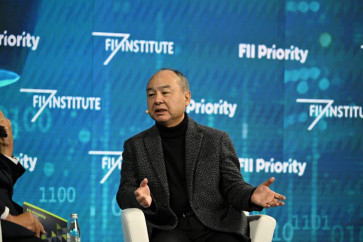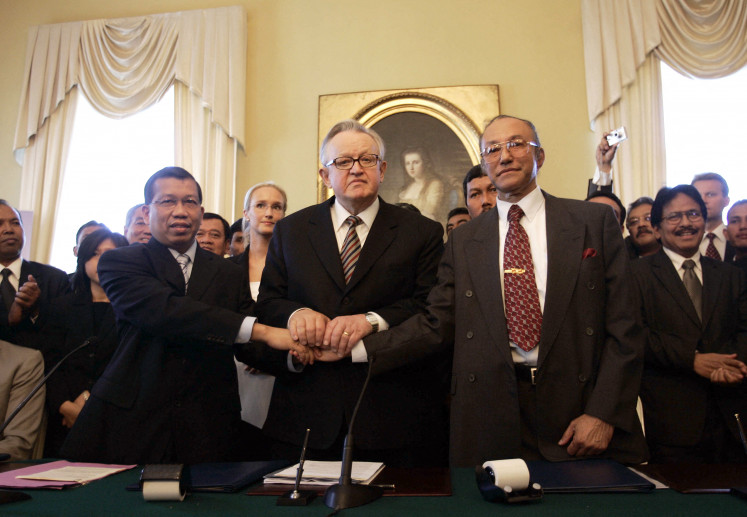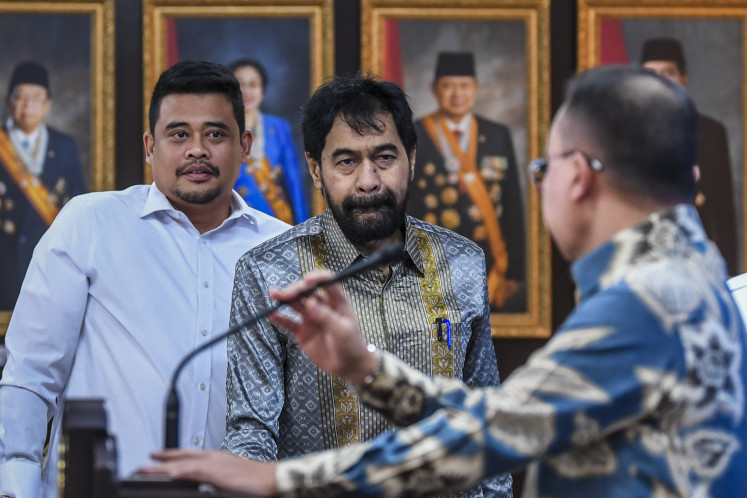Popular Reads
Top Results
Can't find what you're looking for?
View all search resultsPopular Reads
Top Results
Can't find what you're looking for?
View all search resultsEditorial: Fiscal time bomb ticks faster
Energy and Mineral Resources Minister Jero Wacik asserted at the opening of an international conference in Bali on Monday on the development of sustainable electricity that the Indonesian government is strongly determined to develop renewable energy
Change text size
Gift Premium Articles
to Anyone
E
nergy and Mineral Resources Minister Jero Wacik asserted at the opening of an international conference in Bali on Monday on the development of sustainable electricity that the Indonesian government is strongly determined to develop renewable energy.
But a few hours later on that same day, Finance Minister Agus Martowardojo told the House of Representatives Budget Committee in Jakarta that government spending on energy subsidies this year could balloon to Rp 306 trillion (US$32 billion), almost 51 percent more than their original budget allocation.
Martowardoyo proposed that the House approve an additional appropriation of Rp 103 trillion to meet the shortfall and the misguided House would most likely support the huge wasteful spending even though it would take up more than 20 percent of the national budget spending for the whole year.
But the finance minister hastily assured the lawmakers the budget deficit would be kept maximally at 2.3 percent of gross domestic product despite the additional spending on energy subsidies.
What paradoxical statements, saying as if energy subsidies are only a matter of fiscal management.
We expect such illogical, contradictory policy statements only from a pathetic government. Who they think will be willing to invest in the development of renewable energy if the price of fossil fuel remains less than half of its economic cost due to the huge price subsidy?
On top of the policy recommendations of the Paris-based Organization of Economic Cooperation and Development (OECD) stipulated in its 2012 survey on Indonesian economy early this month is an urgent call for slashing fossil-fuel and electricity subsidies.
The OECD urged the government to implement enhanced compensatory cash-transfer programs to prevent a rise in poverty and enforce regulations gradually linking domestic fuel prices to developments in international oil markets. Earlier in September, McKinsey Global Institute also raised an alarm on the skyrocketing increase in Indonesian energy subsidies that have dwarfed public expenditures on education, health care and other social programs combined.
McKinsey even cited energy subsidies, which could skyrocket to $44 billion in 2030, as one of the five key risks to Indonesia’s sustainable growth.
What a gross misallocation of taxpayer money because more than 70 percent of the subsidies benefit private-car owners and the top 50 percent households by income.
The World Bank’s third quarterly report on Indonesia’s economy also raised concern over the energy subsidy, warning that the huge subsidy had discouraged energy efficiency and conservation and increased fuel consumption.
Worse still, the widening gap between subsidized and market prices of fuel (now more than 100 percent) has increased abuse through export smuggling and misuse by industrial users which are supposed to buy fuel at market prices. The World Bank cynically pointed out that government spending on energy subsidies has now been larger than its investment and social programs.
We have time and again argued that uneconomically low fuel prices would lead us into a severe energy crisis through severe supply disruption as fuel subsidies hinder the development of alternative energy resources, which are abundant in the country. But the government, dogged by numerous corruption scandals, has not had political courage to take the bull by the horns.
As a net oil importer which depends on international market for 60 percent of its daily need of 1.4 million barrels, the energy subsidy is making the fiscal time bomb tick even faster.










